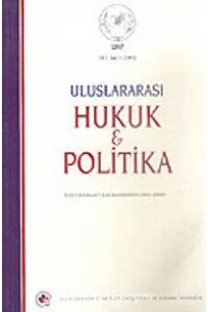Uluslararası Hukukta Yabancıların Hak ve Özgürlükleri
Uluslararası hukukta yabancıların hak ve özgürlüklerinin korunması, yabancının vatandaşı olduğu devletin klasik devletler hukuku araçlarını kullanılarak sağladığı diplomatik himayeden, yabancının haklarını düzenleyen uluslararası belgelere doğrudan başvurmak suretiyle sağlanan bireysel koruma yönünde değişime uğramıştır. Çalışmanın temel amacı, uluslararası hukukta geliştirilen temel insan hakları normlarının yabancıların hak ve özgürlüklerinin korunması alanına nasıl uygulanabildiğini ortaya koymaktır. Çalışmada bu bağlamda yabancıları ve göçmenleri ilgilendirdiği ölçüde belli başlı uluslararası sözleşme hükümleri ile uluslararası mahkeme kararları ve literatür gözden geçirilmektedir. Burada incelenen uluslararası insan hakları normları devletlerin göçmenlere ve yabancılara yapacakları muamelenin asgari standartları konusunda bir bakış açısı sunmaktadır. irdelenen temel uluslararası hukuk normlarının etkinliği doğal olarak iç hukukta yerleşik uluslararası hukukun bağlayıcılığı anlayışı ile doğru orantılıdır. Buna ilave olarak, uluslararası hukukun yabancının ülkeye girişi konusunda sağladığı güvencenin sınırlı olduğu, ancak istisnai durumlarda devletlere tanınmış yetkilere sınırlama getirebildiği görülmüştür. Ayrıca, uluslararası hukuk ilkelerinin genel niteliği ve devletlerce belirli koşullara bağlanabilmeleri bu ilkelerin etkinliğini azaltabilmektedir. Diğer taraftan, burada incelenen temel ilkeler, yasama organı ve idare açısından yol gösterici, yargı organları açısından ise idari işlemlerin denetiminde başvurulabilecek birer temel ölçüt olma özelliğine sahip bulunmaktadırlar.
Rights and Freedoms of Foreigners Under International Law
The nature of protection of the rights and freedoms of foreigners in international law has changed from diplomatic protection afforded by the state of nationality through the use of classical instruments of international law to the individual protection provided by direct recourse to the international instruments governing the rights of foreigners. The main aim of this work is to test how the basic norms of human rights developed by international law have been applied into the area of the protection of the rights and freedoms of foreigners. The study reviews in this context the principal provisions of international conventions as well as decisions of international courts and literature so far as they are concerned with the legal position of foreigners and migrants. The international human rights norms that have been developed here provide usan overview of the minimum standards that states should afford to migrants and foreigners. The efficiency of the basic norms of international law considered depend naturally on the understanding of the binding nature of international law under domestic law. Thepresent study observes that the protection afforded to foreigners by international law in the field of initial entry into the country has a limited role, though it could have some limited restriction on state powers under exceptional circumstances. Further, the general nature of the principles of international law as well as their being tied to certain conditions by the state could reduce the effectiveness of these principles. On the other hand, the basic principles considered here could have the characteristics of guidelines for the legislative and the executive and function as the basic criteria for the judiciary for supervising and controlling administrative actions.
